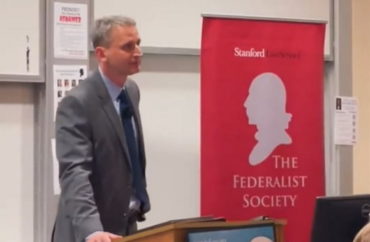
Sorry not sorry.
U.S. Court of Appeals for the Fifth Circuit Judge Kyle Duncan, who was recently berated and shouted at as he attempted to give a speech at Stanford University, has a message for the law students who disrupted his speech.
“I have been criticized in the media for getting angry at the protesters. It’s true I called them ‘appalling idiots,’ ‘bullies’ and ‘hypocrites.’ They are, and I won’t apologize for saying so. Sometimes anger is the proper response to vicious behavior,” Duncan wrote in a March 17 op-ed in The Wall Street Journal.
The piece was titled “My Struggle Session at Stanford Law School: A dean voices pride that students are being taught to stage tantrums rather than make a reasoned case.”
In it, the federal judge details more of the berating taunts he received at what is supposed to be one of the most prestigious law schools in the nation:
When I arrived, the walls were festooned with posters denouncing me for crimes against women, gays, blacks and “trans people.” Plastered everywhere were photos of the students who had invited me and fliers declaring “You should be ASHAMED,” with the last word in large red capital letters and a horror-movie font. This didn’t seem “collegial.” Walking to the building where I would deliver my talk, I could hear loud chanting a good 50 yards away, reminiscent of a tent revival in its intensity. Some 100 students were massed outside the classroom as I entered, faces painted every color of the rainbow, waving signs and banners, jeering and stamping and howling. As I entered the classroom, one protester screamed: “We hope your daughters get raped!”
Duncan went on to describe one of the issues that had protesters most upset: he did not use a defendant’s preferred pronouns in a written ruling.
Turns out the transwoman Stanford Law students were so passionately defending is a pedophile.
“A federal prisoner serving a term for attempted receipt of child pornography (and with a previous state conviction for possession of child porn) petitioned our court to order that he be called by feminine pronouns. As my opinion explained, federal courts can’t control what pronouns people use,” Duncan wrote.
The judge also shone a spotlight on Tirien Steinbach, the diversity, equity and inclusion dean at Stanford Law School who defended the protesters and questioned whether free speech is “worth the squeeze.”
“What could that mean? While the students rhythmically snapped, Ms. Steinbach attempted to explain,” the judge wrote. “My ‘work,’ she said, ‘has caused harm.’ It ‘feels abhorrent’ and ‘literally denies the humanity of people.'”
“… She assured me I was ‘absolutely welcome in this space’ because ‘me and many people in this administration do absolutely believe in free speech.’ I didn’t feel welcome—who would? And she repeated the cryptic question: ‘Is the juice worth the squeeze?'”
Duncan continued:
I asked again what she meant, and she finally put the question plainly: Was my talk “worth the pain that this causes and the division that this causes?” Again she asserted her belief in free speech before equivocating: “I understand why people feel like the harm is so great that we might need to reconsider those policies, and luckily, they’re in a school where they can learn the advocacy skills to advocate for those changes.” Then she turned the floor back over to me, while hoping I could “learn too” and “listen through your partisan lens, the hyperpolitical lens.” In closing, she said: “I look out and I don’t ask, ‘What’s going on here?’ I look out and I say, ‘I’m glad this is going on here.’ ” This is on video, and the entire event is on audio, in case you’re wondering.
The federal judge summarized what happened next: half the students filed out, the rest stayed and asked “hostile” questions, so he shut it down early and was escorted out by two U.S. Marshals for his own safety.
“The most disturbing aspect of this shameful debacle is what it says about the state of legal education,” Duncan wrote. “Stanford is an elite law school. The protesters showed not the foggiest grasp of the basic concepts of legal discourse: That one must meet reason with reason, not power. That jeering contempt is the opposite of persuasion. That the law protects the speaker from the mob, not the mob from the speaker.”
VIDEO: Stanford Law DEI dean, rowdy student protesters berate federal judge invited to give speech
Like The College Fix on Facebook / Follow us on Twitter







Please join the conversation about our stories on Facebook, Twitter, Instagram, Reddit, MeWe, Rumble, Gab, Minds and Gettr.